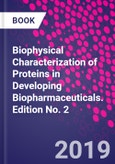Biophysical Characterization of Proteins in Developing Biopharmaceuticals, Second Edition, presents the latest on the analysis and characterization of the higher-order structure (HOS) or conformation of protein based drugs. Starting from the very basics of protein structure, this book explains the best way to achieve this goal using key methods commonly employed in the biopharmaceutical industry. This book will help today's industrial scientists plan a career in this industry and successfully implement these biophysical methodologies. This updated edition has been fully revised, with new chapters focusing on the use of chromatography and electrophoresis and the biophysical characterization of very large biopharmaceuticals.
In addition, best practices of applying statistical analysis to biophysical characterization data is included, along with practical issues associated with the concept of a biopharmaceutical's developability and the technical decision-making process needed when dealing with biophysical characterization data.
Please Note: This is an On Demand product, delivery may take up to 11 working days after payment has been received.
Table of Contents
I: Proteins and Biophysical Characterization in the Biopharmaceutical Industry 1. The Complexity of Protein Structure and the Challenges it Poses in Developing Biopharmaceuticals 2. Biophysical Characterization and Its Role in the Biopharmaceutical Industry 3. Biopharmaceutical Industry's Biophysical Toolbox
II: The Selected Biophysical Tools in the Biopharmaceutical Industry 4. An Introduction and Hierarchical Organization of the Biophysical Tool 5. The Value of UV, Fluorescence, and FTIR Spectroscopy in Biopharmaceutical Development 6. Circular Dichroism Spectroscopy for Protein Characterization: Biopharmaceutical Applications 7. Size-Exclusion Chromatograph (SEC) in Biopharmaceutical Process Development 8. Scattering Techniques for the Characterization of Biopharmaceuticals 9. Characterizing Biopharmaceuticals using Analytical Ultracentrifugation 10. Sub-visible and Visible Particle Analysis in Biopharmaceutical Research and Development 11. Differential Scanning Calorimetry in the Biopharmaceutical Sciences 12. Biophysical Mass Spectrometry for Biopharmaceutical Process Development: Focus on Hydrogen/Deuterium Exchange 13. One- and Two-Dimensional NMR Techniques for Biopharmaceuticals 14. Use of Chromatography and Electrophoresis for indirectly assessing Biophysical Characterization
III: Concluding Remarks on the Biophysical Characterization of Biopharmaceuticals 15. Biophysically Characterization of very large Biopharmaceuticals 16. Statistical Analysis of Biophysical Characterization Data 17. Biopharmaceutical Developability 18. Technical Decision-making dealing with Biophysical Characterization Data 19. Biophysical Characterization: An Integral Part of the "Totality of the Evidence" Concept
Authors
Damian J. Houde Relay Therapeutics, Cambridge, MA, USA and Department of Chemistry and Chemical Biology at the Northeastern University, Boston, MA, USA.Damian J. Houde is Professor at the Department of Chemistry and Chemical Biology at the Northeastern University in Boston, MA. He teaches undergraduate and graduate level chemistry, biochemistry courses, and bioanalytical biochemistry. Further he is scientist, analytical development at Biogen Idec, Inc. in Cambridge, MA. He performs detailed biochemical and biophysical characterization of protein biopharmaceuticals (primarily
monoclonal antibodies and Fc-fusion proteins) for structure activity relationship studies, investigates the conformation, dynamics, and interactions (epitope mapping) of protein biopharmaceuticals, with hydrogen-deuterium exchange mass spectrometry, assesses, develops, and evaluates new biochemical and biophysical protein characterization tools, coordinates and manages external academic (Northeastern University and University of Mass at Amherst) and internal research collaborations, manages and maintains mass spectrometry instrumentation, and conducts method transfers to QC. In 2009 he received the Douglas and Irena DeVivo Award (Northeastern University), in 2008 the Biogen IDEC Technology Investment Award, in 2008 the Biogen IDEC Technology Investment Award, Outstanding presentation, and in 2007 the Biogen IDEC Technology Investment Award
Steven A. Berkowitz Consultant, Sudbury, MA, USA.
Steven A. Berkowitz is a principal investigator in the department of analytical development at Biogen Idec, Inc. in Cambridge MA. His technical areas of expertise are concentrated in the separation sciences and the physical sciences associated with the characterization of biopolymers and synthetic polymers where he has over 40 peer reviewed publication and has presented numerous talks and posters at a wide range of technical meetings. Much of Dr. Berkowitz's work has centered on assessing the physico-chemical properties, micro-heterogeneity and aggregation properties of biopharmaceuticals using light scattering, analytical ultracentrifugation, chromatography, electrophoresis, and various forms of spectroscopy. His present responsibilities are now focused on providing biophysical information on the higher-order structure and structural dynamics of biopharmaceuticals and the development and evaluation of analytical tools such as H/DX-MS and NMR to support this area.
Dr. Berkowitz received a B.S. degree in Biology from Fairleigh Dickinson University and a Ph.D. degree in Biochemistry from New York University. He then spent several years as a post-doctoral fellow at Yale University and the NIH. After his post-doctoral work Dr. Berkowitz held various positions at Celanese Research Company, J.T. Baker, and Lederle Laboratories before taking his present position at Biogen Idec.








